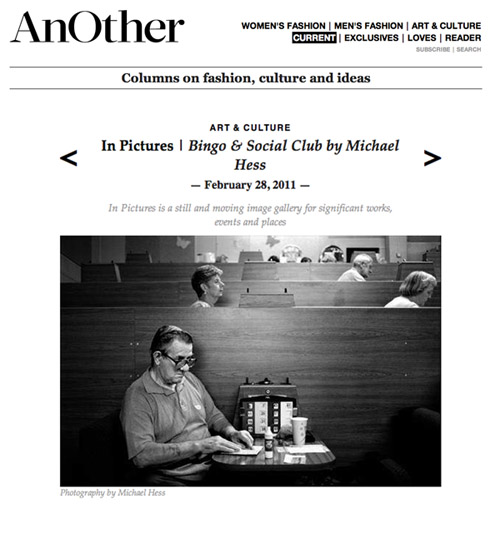 |
|
 |
|
The
Guardian
Interview by Andrew Pulver, 2011 |
|
|
The
Independent
Photo
slideshow, 2011 |
|
|
The
Telegraph
Audio
slideshow, 2011 |
|
|
CreativeReview
Exhibition
review, 2011 |
|
|
AnOther
>>>
Interview
by Lucia Davies, 2011 |
|
|
Photosense
Exhibition
review by Oran Blackwood, 2011 |
|
|
IDOL
Interview
by Liz Foggit, 2011 |
|
|
Nude
Magazine
Book
review by Suzy Prince, 2011 |
|
|
Who's
Jack
Interview
by Lu Orcheston-Findlay, 2011 |
|
|
The
Other Side Magazine
Interview,
2011 |
|
|
|
Every day of the week at around 1pm, nearly 600 bingo halls across
the UK open their doors to thousands of loyal customers. But, although
they can be found on almost every British high street, surprisingly
few people ever see what goes on inside. In Bingo & Social Club,
London-based photographer Michael Hess opens the doors on this much-loved
pastime providing an intimate insight into its gamers and often
nostalgic-looking interiors. Candidly capturing the energy and vibrancy
inside the often crumbling exterior walls of bingo halls across
the country on old classic 35mm black and white film, Hess' images
- taken over four years and in nearly 70 different venues - were
published last year in collaboration with writer Maxine Gallagher
to great critical acclaim. This week Bingo & Social Club takes the
form of an exhibition at The Book Club, London. As Hess prepares
for the show, we speak to him about where his fascination in bingo
halls all began and what he thinks about their recent decline and
increasing closures nationwide.
What sparked your interest in bingo halls?
Nothing more than curiosity. I lived near a bingo hall in Southampton
and always used to wonder what went on inside. What kept the groups
of women standing smoking outside coming back every night? I also
loved the look - a big old converted cinema covered in neon signs
and peeling posters. One evening in 2005 I went there and played
a game - I didn't cross off many numbers, I was too busy looking
around me. I fell in love with the characters and the faded glamour.
The next time I went back with my camera, and four years and nearly
70 bingo halls later I had enough material to make the book Bingo
& Social Club.
Why
did you find them important to document?
I
never went there with the intention of highlighting a dying part
of Britain's history, or to create an important document. I went
there to tell a story, to create a snapshot of people who play bingo,
to say something about their lives and to capture the essence of
these fascinating places. As the project went on I was only too
aware how important bingo halls are to many communities, almost
like church halls used to be. It's a sad fact that in 20, even 10
years all that may be left of them are the photographs, especially
because they're mostly small, independent clubs. But all I set out
to do was do a simple story about people.
Do
you have any interesting stories to tell from your four years travelling
around bingo halls?
There's
a story behind every picture. That's why myself and the writer,
Maxine Gallagher, decided to include these, rather than a more conventional
social commentary in the book. The words from their mouths were
far funnier and more interesting that anything we could say. I'll
always remember one night in Paradise Island in Liverpool. As they'd
given me permission to take pictures of them, they demanded that
I sang karaoke for them in return. I sang a duet of Suspicious Minds
with a hilarious woman called Gill.
Did
you pick up any game tips up and have you become a bingo enthusiast?
I
certainly proved a lack of talent for bingo. I didn't win once in
four years. Maxine was more lucky, she won £7 in Crown Bingo in
Newcastle. The winning ticket is in the book. If you want a tip,
though, I'd say find a nice old independent bingo hall with a good,
social atmosphere and sit beside someone who looks interesting.
You probably won't win anything but you'll have a great evening.
What
are your thoughts about the recent decline in bingo as a game and
the shutting down of numerous halls and clubs across the country?
It's
very sad. As one manager said, they're an extension to many people's
living rooms. She said for some of her customers, they wouldn't
talk to anyone all week if his hall wasn't there. I suppose times
move on and many of the clubs haven't reinvented themselves for
a new generation. It's not all bad news though. Some clubs have
moved on, and even though they may be chains and often looked down
upon, they can still have social club atmospheres. Places like Beacon
Bingo in Cricklewood and Mecca in Knotty Ash. It's a lot to do with
the callers, the people who run them, and how much they value people
over profits.
Text
by Lucia Davies
Lucia
Davies is a London-based writer and has contributed to titles including
AnOther Magazine, Dazed & Confused, The Independent, It's Nice That,
Nowness, Twin and Wonderland.
|
|
|
|
|
|
|
|
|
|